Related Research Articles

The American Revolutionary War, also known as the Revolutionary War or American War of Independence, was a military conflict that was part of the broader American Revolution, where American Patriot forces organized as the Continental Army and commanded by George Washington defeated the British Army.
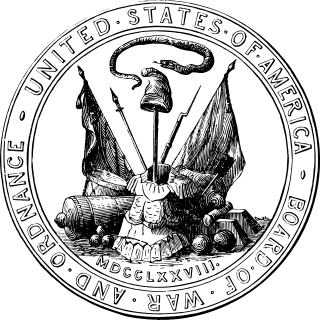
The Continental Army was the army of the United Colonies representing the Thirteen Colonies and later the United States during the American Revolutionary War. It was formed on June 14, 1775 by a resolution passed by the Second Continental Congress, meeting in Philadelphia after the war's outbreak. The Continental Army was created to coordinate military efforts of the colonies in the war against the British, who sought to maintain control over the American colonies. General George Washington was appointed commander-in-chief of the Continental Army and maintained this position throughout the war.
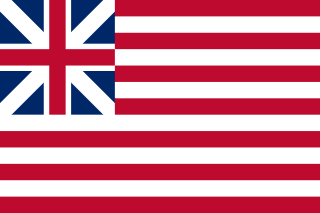
The history of the United States from 1776 to 1789 was marked by the nation's transition from the American Revolutionary War to the establishment of a novel constitutional order.
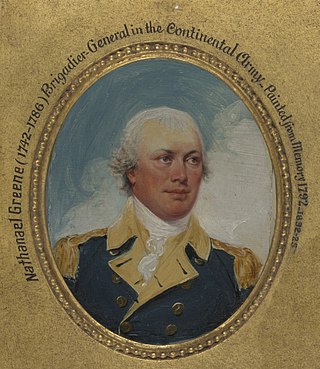
Major-General Nathanael Greene was an American military officer and planter who served in the Continental Army during the Revolutionary War. He emerged from the war with a reputation as one of George Washington's most talented and dependable officers, and is known for his successful command in the Southern theater of the conflict.

The 1st Rhode Island Regiment was a regiment in the Continental Army raised in Rhode Island during the American Revolutionary War (1775–83). It was one of the few units in the Continental Army to serve through the entire war, from the siege of Boston to the disbanding of the Continental Army on November 3, 1783.
The 1st North Carolina Regiment of the Continental Army was raised on September 1, 1775, at Wilmington, North Carolina. In January 1776 the organization contained eight companies. Francis Nash was appointed colonel in April 1776. The regiment was present at the defense of Charleston in 1776. It transferred from the Southern Department to George Washington's main army in February 1777. At that time, Thomas Clark became colonel of the 1st Regiment. The regiment became part of General Francis Nash's North Carolina Brigade in July.
The 2nd North Carolina Regiment was an American infantry unit that was raised for the Continental Army during the American Revolutionary War. In 1776 the regiment helped defend Charleston, South Carolina. Ordered to join George Washington's main army in February 1777, the regiment subsequently fought at Brandywine and Germantown during the Philadelphia Campaign. After most other North Carolina regiments were sent home to recruit, the 1st and 2nd Regiments remained with the main army and fought at Monmouth in June 1778. The regiment was transferred to the Southern Department and was captured by the British army in May 1780 at the Siege of Charleston. Together with the 1st Regiment, the unit was rebuilt and fought capably at Eutaw Springs. The 2nd was furloughed in April 1783 and officially dissolved in November 1783.
The 1st Georgia Regiment, or as it was also known, the 1st Georgia was a regiment of the Continental Army, and formed part of the Georgia Line.
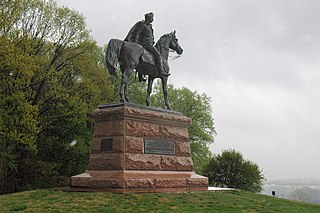
The Philadelphia campaign (1777–1778) was a British military campaign during the American Revolutionary War designed to gain control of Philadelphia, the Revolutionary-era capital where the Second Continental Congress convened and formed the Continental Army and appointed George Washington as its commander in 1775, and authored and unanimously adopted the Declaration of Independence the following year, on July 4, 1776, which formalized and escalated the war.

The North Carolina Line refers to North Carolina units within the Continental Army. The term "North Carolina Line" referred to the quota of infantry regiments assigned to North Carolina at various times by the Continental Congress. These, together with similar contingents from the other twelve states, formed the Continental Line. The concept was particularly important in relation to the promotion of commissioned officers. Officers of the Continental Army below the rank of brigadier general were ordinarily ineligible for promotion except in the line of their own state.
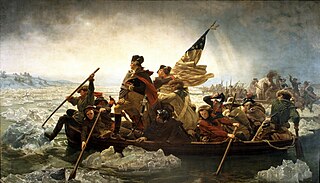
Pennsylvania was the site of many key events associated with the American Revolution and American Revolutionary War. The city of Philadelphia, then capital of the Thirteen Colonies and the largest city in the colonies, was a gathering place for the Founding Fathers who discussed, debated, developed, and ultimately implemented many of the acts, including signing the Declaration of Independence, that inspired and launched the revolution and the quest for independence from the British Empire.
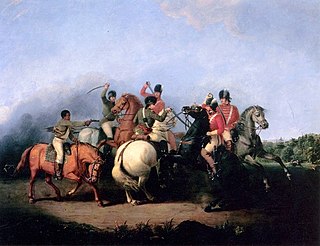
The southern theater of the American Revolutionary War was the central theater of military operations in the second half of the American Revolutionary War, 1778–1781. It encompassed engagements primarily in Virginia, Georgia, North Carolina, and South Carolina. Tactics consisted of both strategic battles and guerrilla warfare.
James Moore was a Continental Army general during the American Revolutionary War. Moore was born into a prominent political family in the colonial Province of North Carolina, he was one of only five generals from North Carolina to serve in the Continental Army. He spent much of his childhood and youth on his family's estates in the lower Cape Fear River area, but soon became active in the colonial military structure in North Carolina.

The Carlisle Peace Commission was a group of British peace commissioners who were sent to North America in 1778 to negotiate terms with the rebellious Continental Congress during the American Revolutionary War. The commission carried an offer of self-rule, including parliamentary representation within the British Empire. The Second Continental Congress, aware that British troops were about to be withdrawn from Philadelphia, insisted on demanding full independence, which the commission was not authorised to grant.

Thomas Polk was a planter, military officer in the Continental Army during the American Revolutionary War from 1775 to 1781, and a politician who served in the North Carolina House of Commons, North Carolina Provincial Congress, and Council of State. Polk commanded the 4th North Carolina Regiment in the Battle of Brandywine. In 1786, Polk was elected by the North Carolina General Assembly to the Congress of the Confederation, but did not attend any of its sessions. Polk was a great-uncle of the 11th President of the United States, James K. Polk.
The following bibliography includes notable books concerning the American Revolutionary War. These books are listed in the bibliographies of books by prominent historians as shown in the footnotes.
References
- 1 2 Richmond, Robert P. (1971). Powder Alarm 1774. Princeton: Auerbach. ISBN 978-0-87769-073-3.
- ↑ Cobbett's Parliamentary History of England: From the Norman Conquest, in 1066 to the Year 1803. AD 1774 - 1777. Bagshaw. 1813.
- ↑ Daughan, George C. (2018). Lexington and Concord: The Battle heard round the world (1st ed.). New York: W.W. Norton & Company. ISBN 978-0-393-24574-5.
- ↑ Chidsey, Donald Barr (1966). The siege of Boston; an on-the-scene account of the beginning of the American Revolution. Internet Archive. New York, Crown.
- ↑ Randall, Willard Sterne (1990). Benedict Arnold: patriot and traitor (1st ed.). New York: Morrow. ISBN 978-1-55710-034-4.
- ↑ Nelson, James L. (2008). George Washington's secret navy: how the American revolution went to sea. New York: McGraw-Hill. ISBN 978-0-07-149389-5.
- ↑ Ketchum, Richard M. (1999). Decisive day: the Battle for Bunker Hill (1st ed.). New York: H. Holt. ISBN 978-0-8050-6099-7.
- ↑ Roberts, Robert B. (1988). Encyclopedia of historic forts: the military, pioneer, and trading posts of the United States. New York, N.Y. u.a: Macmillan. p. 603. ISBN 978-0-02-926880-3.
- ↑ Garland, Joseph E. (2006). The fish and the falcon: Gloucester's resolute role in America's fight for freedom. Charleston, SC: History Press. ISBN 978-1-59629-007-5.
- ↑ Chernow, Ron (2004). Alexander Hamilton. New York: Penguin Press. ISBN 978-1-59420-009-0.
- ↑ Gabriel, Michael P. (2002). Major general Richard Montgomery: the making of an American hero. Madison, NJ : London: Fairleigh Dickinson University Press ; Associated University Press. ISBN 978-0-8386-3931-3.
- ↑ "Canada & the American Revolution, 1774-1783 | WorldCat.org". search.worldcat.org. Retrieved 2024-04-10.
- ↑ Miller, Nathan (1974). Sea of glory: the Continental Navy fights for independence, 1775-1783. New York: D. McKay Co. ISBN 978-0-679-50392-7.
- ↑ Selby, John E. (2007). The Revolution in Virginia, 1775-1783. Williamsburg, Va. : Charlottesville, Va: Colonial Williamsburg Foundation ; Distributed by the University of Virginia Press. ISBN 978-0-87935-233-2.
- 1 2 Alden, John Richard; Stephenson, Wendell Holmes (1976). The South in the revolution: 1763 - 1789. A history of the South : [in eleven volumes] / eds. Wendell Holmes Stephenson. Baton Rouge, La.: Louisiana State Univ. Press [u.a.] ISBN 978-0-8071-0003-5.
- ↑ Wilson, David K. (2005). The southern strategy: Britain's conquest of South Carolina and Georgia, 1775-1780. Columbia: University of South Carolina Press. ISBN 978-1-57003-573-9.
- ↑ Huff, 22; Bobby Gilmer Moss, The Patriots in the Snow Campaign, 1775 (Blacksburg, SC: Scotia Hibernia Press, 2007), 18.
- ↑ Anderson, Mark R. (2013). The battle for the fourteenth colony: America's war of liberation in Canada, 1774-1776. Hanover, New Hampshire: University Press of New England. ISBN 978-1-61168-497-1.
- ↑ Russell, David Lee (2000). The American Revolution in the Southern colonies. Jefferson, N.C: McFarland & Co. ISBN 978-0-7864-0783-5.
- ↑ Wilson, David K. (2005). The southern strategy: Britain's conquest of South Carolina and Georgia, 1775-1780. Columbia: University of South Carolina Press. ISBN 978-1-57003-573-9.
- ↑ Russell, David Lee (2006). Oglethorpe and colonial Georgia: a history, 1733-1783. Jefferson, N.C: McFarland & Co. ISBN 978-0-7864-2233-3. OCLC 62888912.
- ↑ Field, Edward (1898). Esek Hopkins, commander-in-chief of the continental navy during the American Revolution, 1775 to 1778 : master mariner, politician, brigadier general, naval officer and philanthropist. Harvard University. Providence : Preston & Rounds Co.
- ↑ Brown, Gerald S.; Lanctot, Gustave; Cameron, Margaret M. (1968). "Canada and the American Revolution, 1774-1783". The Journal of Southern History. 34 (2): 294. doi:10.2307/2204675. ISSN 0022-4642. JSTOR 2204675.
- ↑ Morison, Samuel Eliot (1999). John Paul Jones: A Sailor's Biography. Naval Institute Press. ISBN 978-1-55750-410-4.